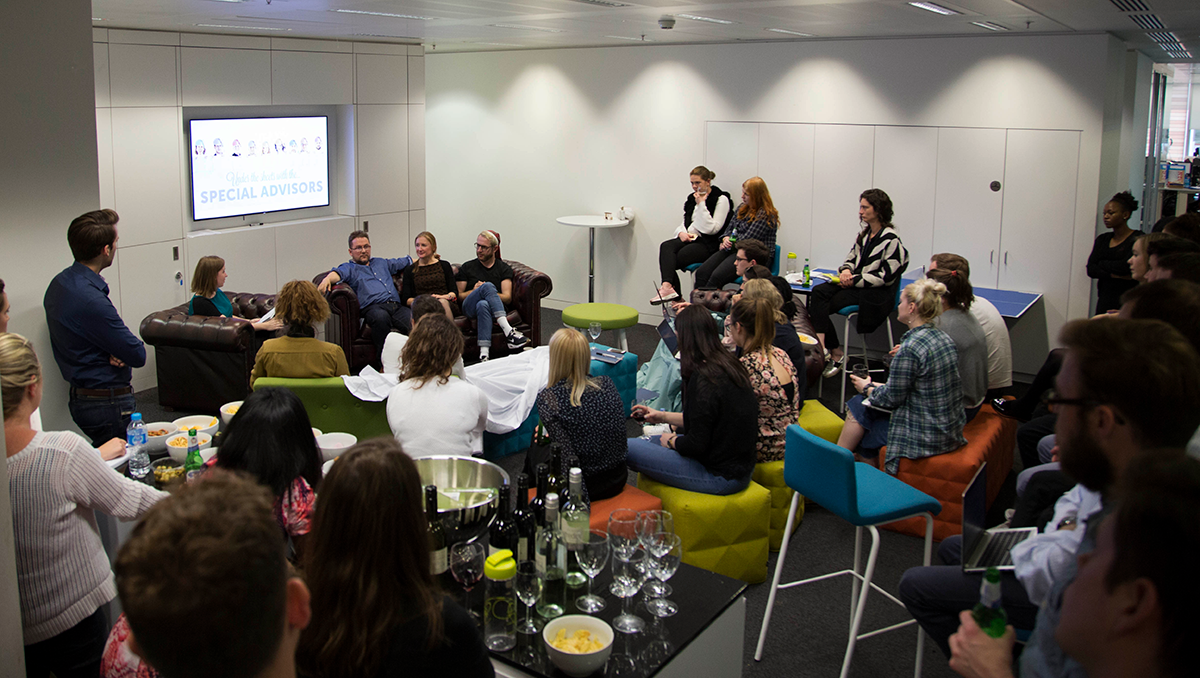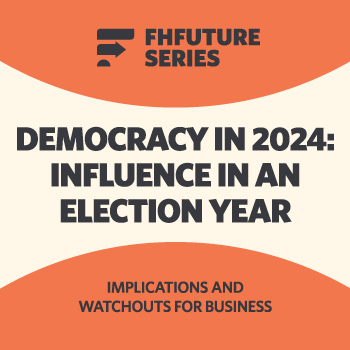Under the Sheets with... Nick Andrews, Ali Gee & Kev O'Sullivan
Across FleishmanHillard Fishburn there are nine special advisors. With over 60(ish, we’re too polite to enquire the exact amount) years of communications and media experience, they are on hand to provide advice to employees and clients wherever they might need it, both creatively and strategically. Recently we took the chance to get to know three of them a little better, in our inaugural ‘Under the Sheets’ session.

Sleeping caps adorned, lavender oil diffused, Laurel Buchanan asked Nick Andrews, Kev O’Sullivan and Ali Gee to give us an insight into their roles and experiences.
Here are the top five things we learnt from the session:
- GET A JOB TO GET A JOB
When asked whether they knew what they wanted to do at the start of their career, Nick, Ali and Kev all agreed that no, they did not.
Nick started his career in finance where, in his own words, he ‘combined no interest with no talent’. He knew that there were two things he was really good at though: writing and chatting. Nick’s natural talents led him to PR, where he shined.
Nick’s words resonated with Ali: she recalled the time she thought that being bad at maths could be an obstacle to her development. During her time at Red, she learnt that whilst her core skills did not lie in media relations, she loved doing and was good at drafting pitch documents and strategy. Her advice is to find your star skill, and hold on to it until you can make it your main focus.
Kev remarked on Ali’s point, encouraging the FHF team to be versatile and ‘bounce around like a ping-pong ball’ until you find the role that fits you.
Our key takeaway: In your career you need to look for the opportunities to work with what you like, but opening up to the unknown may help your great love in PR find you, rather than the other way around.
- YOUR SPECIALISM IS YOUR STRENGTH
When it comes to deciding your specialism, Kev, Nick and Ali all seemed to agree that it’s less about “deciding”, and more about pursuing your strengths. This is something that the agency has been encouraging us all to do since day one. Essentially, if you’re trying to do something that you aren’t good at, you’ll tend to find it draining. Instead focus on the areas that you are strong in, you’ll often find them to be a source of energy.
As far as finding your speciality, Ali advised us that the goal has to be to find the job you would do if you weren’t paid: “If there is one aspect of the job that you would do almost for free, that’s your thing and it’s the thing you should pursue.”
Nick recalled a time where he thought he wanted to be ‘the man in charge’ aka CEO, only to realise when he got there, that this wasn’t his passion. Ali remarked that it’s easy to get caught up in wanting to get to ‘the top’, only to realise that you’re being buffeted away from the things that you’re passionate about.
Our key takeaway: By continuing to look for growth in your individual areas of strength, you are also able to best prove your value: “Being good at something makes you bullet proof. Doing things you’re mediocre at makes you vulnerable.” Also, as Nick noted, progress doesn’t always have be managerial; the Special Advisor role by its very nature is a way to live out your passions as a senior in an agency without needing to be the boss.
- NOT ALL MISTAKES ARE BAD MISTAKES
Back in the day of acetate slides and overhead projectors, Nick spent over a week working solo on a new business pitch for Kellogg’s. After many sleepless nights, he thought he had done a great job. He’d even included coloured images of Tony the Tiger – it was seriously advanced for that day and age.
Fast forward to the morning of the pitch, Nick eagerly sat in reception. After a while he noticed the walls were covered in pictures of buildings. “A little odd,” he thought, “shouldn’t they have had pictures of cereal?” His boss joined him and looked through the slides for the first time in silence. He then revealed the pitch was for Kellogg Brown & Root, an engineering, procurement, and construction company, not Kellogg’s Cereal!
When you make a mistake, all you can do is apologise and learn from it.
Credit to Nick’s boss, they went into the pitch and said that presenting was “too corporate” and that they preferred to just have a conversation.
They won the pitch.
Our takeaway: Mistakes happen. Learn from them and then look back and laugh..
- USE LONDON
Creative block is something that we’re all affected by at one point or another, regardless of whether or not we’re in an explicitly ‘creative’ team. As Creative Director, Kev explained that these moments will happen and, when they do, it’s important to reflect on what your sources of inspiration are.
For Kev, sources are found in the building he works in: it’s the people he works with, their personalities, and their ideas. His job is to bring those things together and help us unlock ideas.
After making us all feel warm and appreciated, he did have one key piece of advice, a call to action: use London. Kev walks to work every day. Headphones on, with a certain blonde pop star (Britney) blasting on repeat, he walks 4.5 miles door to door.
He absorbs the city for inspiration.
It’s the architecture, but also scanning the newsagents, or watching people pass by. For Kev, it’s like being on safari every single day, and he can’t recommend it enough.
Our key takeaway: Try walking through London to gain inspiration
- YOU DO YOU
Our special advisors don’t have a complex recipe for success but rather suggest junior staff embrace a straightforward you-do-you kind of attitude.
Ali explained the problems of affinity bias across all industries, which refers to the tendency to hire a “mini-you”. This in turn prevents a diversity of opinions, personalities, backgrounds and strengths from improving agencies. However, these attitudes are dissolving, and it’s crucial that you own what you’re good at, rather than trying to mould yourself into someone you’re not.
Nick followed on this point by saying that the quality he looks for in junior staff is having ‘an overwhelming desire to share an opinion’. Senior members might have the experience, but junior members often come with knowledge and enthusiasm; this trio of qualities make a great combination.
Kev’s advice was to have an interest – a genuine passion for something rather than broad curiosity. One great thing about passion is that we all have different ones. The greater the difference, the more strengths and backgrounds contributing to developing the agency. And if your passion is different to Kev’s then he’ll lean in, and he’ll inspect it.
Our key takeaway: Be YOU!
Many thanks to Nick, Ali and Kev for answering our questions and sharing with us all these great pieces of advice! We’ve learnt so much from this session and it was a fantastic opportunity for us all. We can’t wait for the next ‘Under the Sheets’ session!
By Jasmine Alexander, Christina Halm, Caley Routledge and Valentina Schiavo
Find Out More
-
Democracy in 2024: Influence in an election year
May 2, 2024
-
Platinum CMS Award
March 13, 2024


